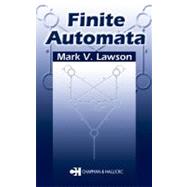
Note: Supplemental materials are not guaranteed with Rental or Used book purchases.
Purchase Benefits
What is included with this book?
| Preface | p. ix |
| Introduction to finite automata | p. 1 |
| Alphabets and strings | p. 1 |
| Languages | p. 5 |
| Language operations | p. 7 |
| Finite automata: motivation | p. 11 |
| Finite automata and their languages | p. 14 |
| Summary of Chapter 1 | p. 21 |
| Remarks on Chapter 1 | p. 22 |
| Recognisable languages | p. 27 |
| Designing automata | p. 27 |
| Incomplete automata | p. 29 |
| Automata that count | p. 33 |
| Automata that locate patterns | p. 37 |
| Boolean operations | p. 40 |
| The Pumping Lemma | p. 45 |
| Summary of Chapter 2 | p. 48 |
| Remarks on Chapter 2 | p. 49 |
| Non-deterministic automata | p. 53 |
| Accessible automata | p. 53 |
| Non-deterministic automata | p. 60 |
| Applications | p. 67 |
| Trim automata | p. 72 |
| Grammars | p. 76 |
| Summary of Chapter 3 | p. 83 |
| Remarks on Chapter 3 | p. 83 |
| [varepsilon]-automata | p. 85 |
| Automata with [varepsilon]-transitions | p. 85 |
| Applications of [varepsilon]-automata | p. 90 |
| Summary of Chapter 4 | p. 95 |
| Remarks on Chapter 4 | p. 95 |
| Kleene's Theorem | p. 97 |
| Regular languages | p. 97 |
| Kleene's theorem: proof | p. 103 |
| Kleene's theorem: algorithms | p. 106 |
| Language equations | p. 114 |
| Summary of Chapter 5 | p. 125 |
| Remarks on Chapter 5 | p. 125 |
| Local languages | p. 127 |
| Myhill graphs | p. 127 |
| Linearisation | p. 134 |
| Summary of Chapter 6 | p. 139 |
| Remarks on Chapter 6 | p. 139 |
| Minimal automata | p. 141 |
| Partitions and equivalence relations | p. 141 |
| The indistinguishability relation | p. 144 |
| Isomorphisms of automata | p. 152 |
| The minimal automaton | p. 155 |
| The method of quotients | p. 157 |
| Summary of Chapter 7 | p. 168 |
| Remarks on Chapter 7 | p. 168 |
| The transition monoid | p. 171 |
| Functions on states | p. 171 |
| The extended transition table | p. 176 |
| The Cayley table of an automaton | p. 183 |
| Semigroups and monoids | p. 185 |
| Summary of Chapter 8 | p. 188 |
| Remarks on Chapter 8 | p. 189 |
| The syntactic monoid | p. 191 |
| Introduction to semigroups | p. 191 |
| Congruences | p. 198 |
| The transition monoid of an automaton | p. 207 |
| The syntactic monoid of a language | p. 209 |
| Summary of Chapter 9 | p. 213 |
| Remarks on Chapter 9 | p. 214 |
| Algebraic language theory | p. 217 |
| Finite semigroups | p. 217 |
| Recognisability by a monoid | p. 224 |
| Two counterexamples | p. 231 |
| Summary of Chapter 10 | p. 234 |
| Remarks on Chapter 10 | p. 234 |
| Star-free languages | p. 235 |
| Introduction | p. 235 |
| Groups | p. 238 |
| Aperiodic semigroups | p. 249 |
| Schutzenberger's theorem | p. 252 |
| An example | p. 258 |
| Summary of Chapter 11 | p. 261 |
| Remarks on Chapter 11 | p. 262 |
| Varieties of languages | p. 265 |
| Pseudovarieties and varieties | p. 265 |
| Equations for pseudovarieties | p. 273 |
| Summary of Chapter 12 | p. 276 |
| Remarks on Chapter 12 | p. 276 |
| Discrete mathematics | p. 279 |
| Logic and proofs | p. 279 |
| Set theory | p. 281 |
| Numbers and matrices | p. 285 |
| Graphs | p. 287 |
| Functions | p. 288 |
| Relations | p. 290 |
| Bibliography | p. 293 |
| Index | p. 303 |
| Table of Contents provided by Rittenhouse. All Rights Reserved. |
The New copy of this book will include any supplemental materials advertised. Please check the title of the book to determine if it should include any access cards, study guides, lab manuals, CDs, etc.
The Used, Rental and eBook copies of this book are not guaranteed to include any supplemental materials. Typically, only the book itself is included. This is true even if the title states it includes any access cards, study guides, lab manuals, CDs, etc.